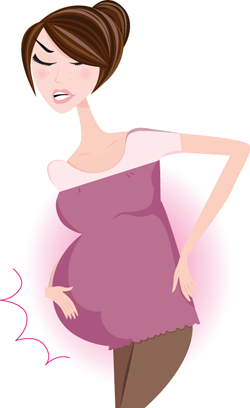Am I In Labour?

It is more difficult than you might think to pinpoint exactly when labour starts. It’s helpful to know which signs may amount to little and which are really telling you that your baby is on its way.
When you’re close to your due date, you’re aware of every twinge or suggestion of abdominal discomfort, wondering if this will be the start of something. The exact trigger for labour is unknown, but it’s thought that hormones produced by your baby’s adrenal gland encourage your placenta to release further hormones that cause your uterus to contract. Other signals are involved too, including the release of prostaglandins, which are also used to induce labour artificially. When your uterus begins to contract, your cervix (neck of your womb) starts to open, or dilate, and labour begins in earnest.
False labour
In the late stages of pregnancy, you may have Braxton Hicks contractions, the practice contractions that prepare your uterus for action. In the days and hours prior to labour, these can be more uncomfortable and occur closer together, sometimes carrying on for hours. However, if the uterus is contracting, but there’s no effacement or dilation of the cervix, this is known as “false labour.” Braxton Hicks do encourage the baby’s head to move down in the pelvis, but until contractions are strong, regular, and develop a pattern, occurring closer together, you’re unlikely to be in labour.
Approaching labour
The experience of labour varies between women, but as labour approaches, there are several signs and symptoms you may experience that tell you your body is preparing itself for the task ahead.
Water breaking
Very few women find that their water breaks (when the amniotic sac breaks and leaks its fluid) before labour. The fluid can either gush or drip out, which can be confused with leaking urine. Usually the sac doesn’t break until labour is established, and sometimes not until just before the birth. If your water breaks, it is a sign that labour is imminent and you should go to the hospital or call your doctor. If labour doesn’t begin within 24 hours, there is a risk of developing an infection, so it’s important that you take instruction from your doctor or midwife and go in for an assessment when asked.
Amniotic fluid should be clear. If it is smelly or blood-stained, contact your doctor or midwife at once. Contact them too if it’s green, which suggests that your baby has passed meconium, and is a sign that she may be distressed.
Other signs and symptoms
You may lose the mucus plug (a collection of mucus that plugs the cervix, which can be bloodstained and is known as a “bloody show”), as well as experience back and/or abdominal pain and feel queasy. Some women suffer diarrhea and even vomiting.
This stage can take several days, so don’t call your doctor yet.
Engagement of the head
You may experience “lightening,” which describes how you feel when your baby’s head drops down in the pelvis, or engages, and the pressure on the diaphragm, which may have made you breathless before, is alleviated. This can happen days or weeks before the birth, but some women feel it just before contractions start. You may need to go to the bathroom more often, as your baby puts pressure on the bladder.
First contractions
As you approach early labour, contractions become uncomfortable and occur increasingly close together, although still irregularly. These differ from Braxton Hicks as they build up and begin to prepare the cervix for labour.
Symptoms you shouldn’t ignore
Call your doctor or midwife if: Your water breaks; your baby moves less than usual; you have vaginal bleeding that is not associated with losing your mucus plug; you have a fever, changes in your vision, severe headaches or abdominal pain; you feel an
urge to push; or you feel like your baby’s head is emerging.
 Excerpted from My Pregnancy Copyright © 2012 by DK Publishing. Excerpted by permission DK Publishing. All rights reserved. No part of this excerpt may be reproduced or reprinted without written permission from the publisher.
Excerpted from My Pregnancy Copyright © 2012 by DK Publishing. Excerpted by permission DK Publishing. All rights reserved. No part of this excerpt may be reproduced or reprinted without written permission from the publisher.



